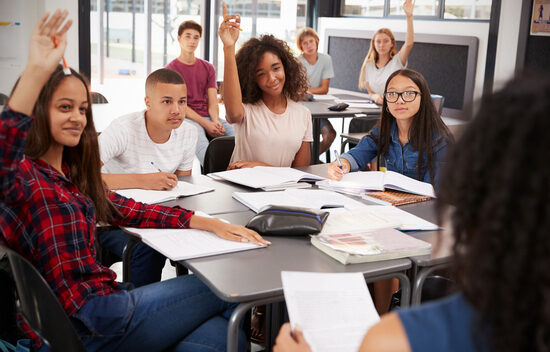
A Personal Response to American Citizenship
50 minHow can you be a good citizen?
Students will:
- Define the concept of citizenship.
- Understand the relationship between private values and public happiness.
- Analyze the civic knowledge, beliefs, and behaviors of good citizens.
- Evaluate avenues for personal civic engagement and good citizenship.
- Handout A: Citizenship Poem
- Handout B: A Good Citizen
- Handout C: Citizen Slips
- Handout D: Citizenship Promise (optional)
- Handout E: “I Am…” Poem (optional)
- Handout F: Citizenship in Action (optional)
Write the following quotation on the board or overhead and read it aloud to the class.
Your love of liberty, your respect for the laws, your habits of industry, and your practice of the moral and religious obligations are the strongest claims to national and individual happiness. –George Washington
Ask students:
- Are the values Washington lists still important today?
- What does Washington mean by “national and individual” happiness?
- Is there a connection between how happy individual people are, and how happy the nation is?
- What about a connection between individual happiness and the happiness of neighborhoods, communities, or states?
- Divide students into groups of three or four and distribute Handout B: A Good Citizen. Give groups five minutes to brainstorm on the Handout about the knowledge, beliefs and actions of a good citizen.
- Reconvene the class and invite students to share their ideas. Keep a list of responses on the board. (Use the Answer Key to facilitate discussion and supplement student responses)
- Keep students in their small groups and have groups draw 5-10 slips from Handout C: Citizen Slips. In their groups, they should answer the question: At this point in your life, what can you do individually in relationship to the knowledge, belief, or action on the Citizen Slip?
- Ask students to put their Citizen Slips into two groups: one for those Slips that describe private exercise of values (e.g. providing for family, keeping one’s promises), and another for Slips that describe public applications of values (e.g. voting, running for office.) Do some slips overlap?
Remind students of the Washington quote that introduced the lesson. Washington and the other Founders believed that a way to ensure the happiness of society was the practice of civic values and good citizenship by individuals. Washington says that the same kinds of beliefs and actions that will bring about personal happiness will also bring about national happiness. Do you agree with him?
- Have students complete Handout D: Citizenship Promise individually. Next time, invite students who wish to do so to post their Promises around the classroom and give students time to view them all. Collect them all at the end of class and return them to students at their graduation.
- Have students write a poem according to the model on Handout E: “I Am…” Poem. Depending on available resources, the poem could be completed on the Handout itself, on a computer with graphics, or mounted on construction paper with photographs or drawings.
- Have students keep a journal over the course of several weeks where they record examples of people demonstrating responsible citizenship in both private and public ways in their homes, schools, and communities. Give students Handout F: Citizenship in Action on which to record their observations.
- Have students interview local community leaders about their roles. They may choose to interview local government officials, members of the PTA or school board, church leaders, businesspeople, or entrepreneurs. Questions they may wish to ask include:
- Why did you choose your line of work?
- What are the advantages and disadvantages of this profession?
- How do you contribute to the community?
- Have students recall what they learned in today’s lesson, as well as the lessons on the Constitution and Bill of Rights, and respond to the following question in a one-page essay: How do the protections in the Constitution and Bill of Rights enable citizens to exercise the civic values necessary for good citizenship?


